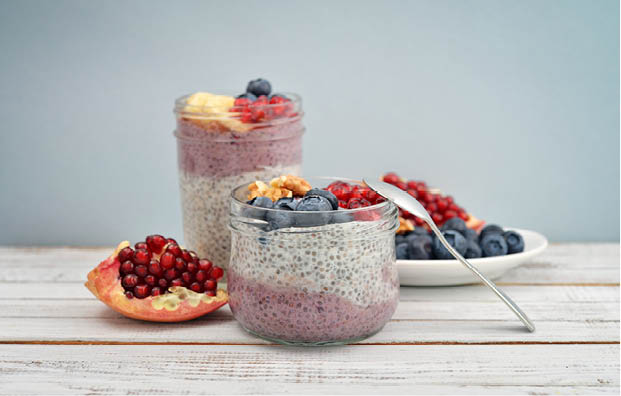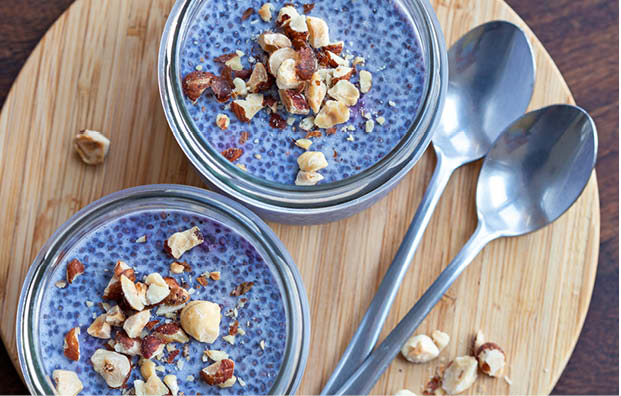Chia seeds (Salvia hispanica L) are a rich source of omega-3 fats and posse several other health benefits.
These tiny super-seeds contain about 32 per cent omega-3 fats, which are essential for cardiovascular health, a healthy brain and nervous system and soft skin. Just 100g of chia seeds contain as much calcium as two cups of milk, making them beneficial for bone health and the prevention of osteoporosis. Chia seeds are also a good source of dietary fibre, which is necessary for bowel health, and protein, which provides the body with essential amino acids for growth and repair.
Chia seeds are also a good source of other minerals such as iron, magnesium, zinc and B vitamins, which will naturally boost energy levels and health.
- They have an unusually high content (18%) of omega-3 fatty acids – essential fats that are important for heart health and brain function. Of the 30% total fat found in chia seeds, more than half is alpha linolenic acid (ALA), which is the plant form of omega-3.
- They have outstanding fibre content. Chia’s 34% fibre is higher than that of flaxseeds (linseed) or sesame seeds, and works out to be about 10g in two tablespoons (which would make a significant contribution to the 25–30g it’s recommended we consume daily).
- They are also an excellent source of protein and extremely high in calcium – at 631mg per 100g, this is five times the level in milk (although it may not be so readily absorbed).
- Chia is also a source of other important minerals including iron, magnesium and zinc. Oh – and it’s gluten free, too.
Given these impressive nutrition credentials, it’s not surprising that chia is commonly spruiked as a “super” food. If you’re to believe the hype, eating chia can help to achieve joint, heart and brain health, weight management and provide longer-lasting energy, among other benefits.
But you can’t always take the marketing of chia at face value. For example, claims that it has “nine times more omega-3 than salmon” – while possibly accurate – don’t give the full picture, as the form of omega-3 in marine sources is more readily used by the body.
Limited research suggests that including chia seeds as part of a healthy diet may help improve cardiovascular risk factors, such as lowering cholesterol, triglycerides and blood pressure. And although claims of weight loss may be far-fetched, the claim that chia helps you feel fuller for longer is likely more valid, due to its high fibre and protein content.
The main issue with making too many health claims about chia is the lack of definitive evidence around it. “There aren’t many published studies on the health benefits of consuming chia seeds, and much of the available information is based on animal studies, or human studies with a small number of research participants,” warns Charlene Grosse, Accredited Practising Dietitian and spokesperson for the Dietitians Association of Australia.
If you wish to read more about chi seeds the above is an extract from an article on the Choice Website https://www.choice.com.au/food-and-drink/nutrition/superfoods/articles/chia-seeds-superfood-or-fad. and you’ll be surprised to read that Western Australia is one of the worlds largest producer of chia seeds!
Basic Chia Pudding
3 cups unsweetened almond milk, you can use plain milk if you prefer
1/2 cup chia seeds
1-3 tablespoons of pure maple syrup, to taste
Suggested toppings:
Granola
Fresh fruit
Coconut flakes
Pure maple syrup
Cinnamon
Nuts and seeds
Whisk the almond milk, chia seeds, and sweetener together in a large bowl. Let sit for 5-10 minutes and then whisk again (this just helps prevent clumping).
Cover and chill in the fridge for 2.5-3 hours, or overnight. It helps to stir the mixture every so often during this time, but don’t worry if you can’t.
Stir well before serving. Portion into bowl(s) and add your desired toppings. Leftovers will keep in an air-tight container in the fridge for 3-5 days.
Chia Pudding with oats and yoghurt
3 tablespoons of oats
4 tablespoons of almond milk
2 tablespoons of yoghurt, vanilla or coconut yoghurt
2 teaspoons of chia seeds
1 teaspoon of caco powder or cinnamon- optional
Serve with a mixture of the following
a handful of cacao nibs, goji berries or raisins
nuts or pumpkin seeds
granola
grated apple
fresh berries or mango slices
a drizzling of raw honey or maple syrup
Simply place the oats, chia seeds, almond milk and yoghurt into a jar and stir them together. Then place the lid on the jar and store it in the fridge overnight, or for at least four hours.
Once it’s ready to eat add your toppings and enjoy!
This should last about two to three days in the fridge if it’s kept in an air-tight container.





